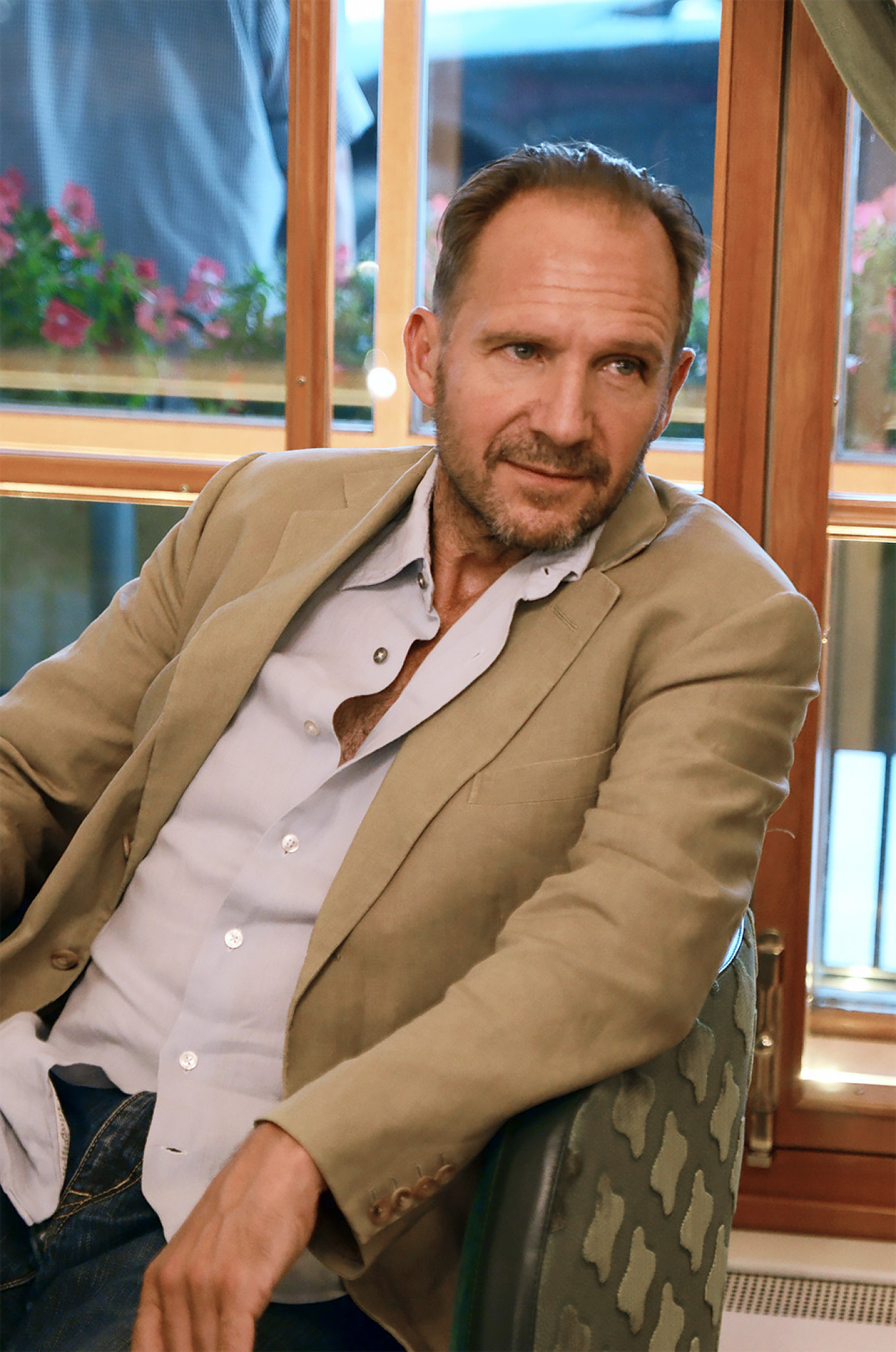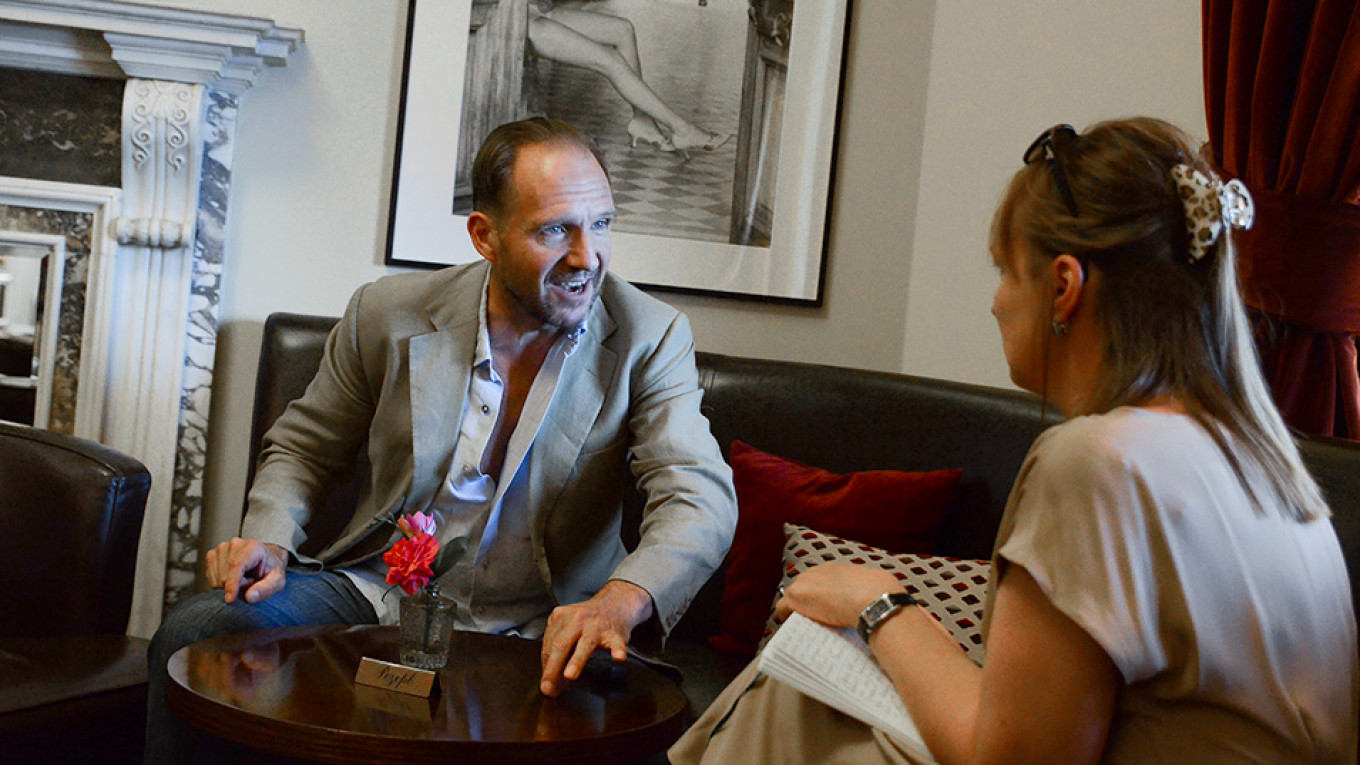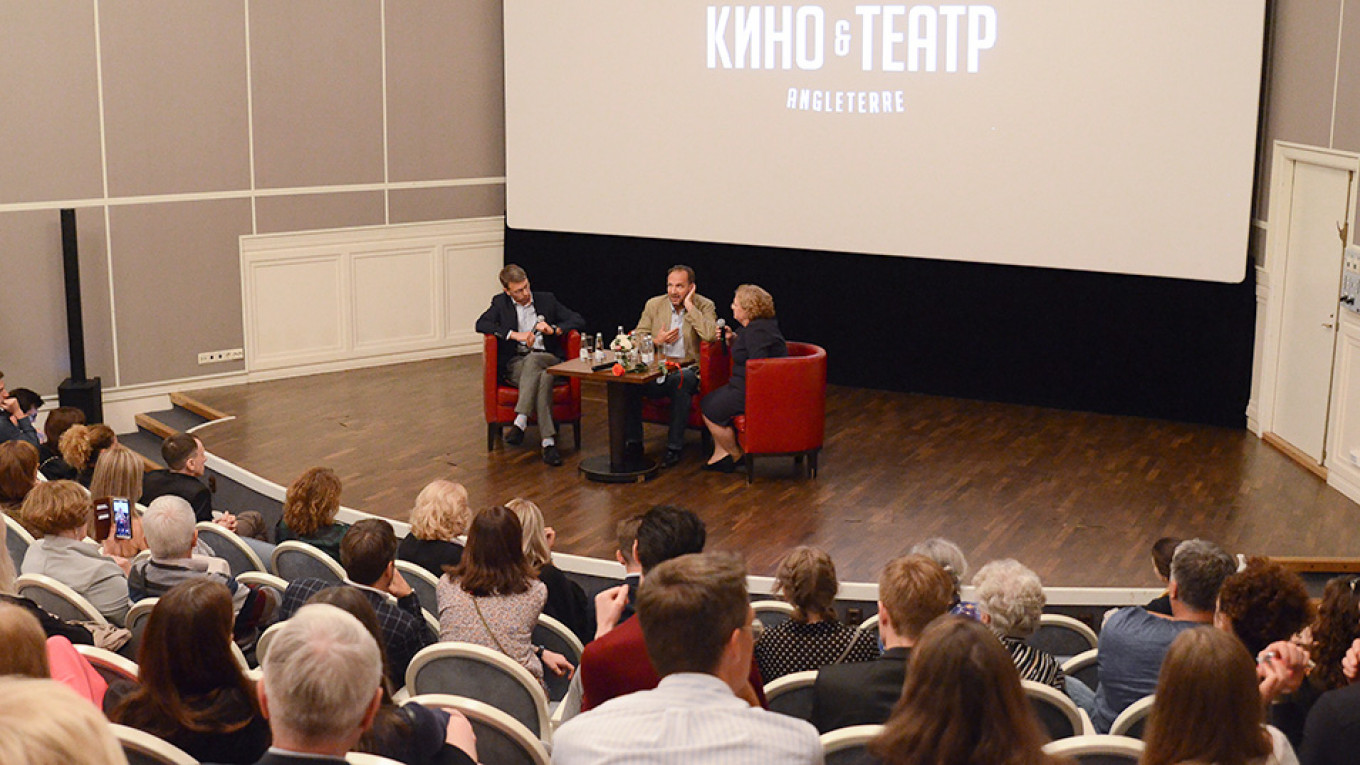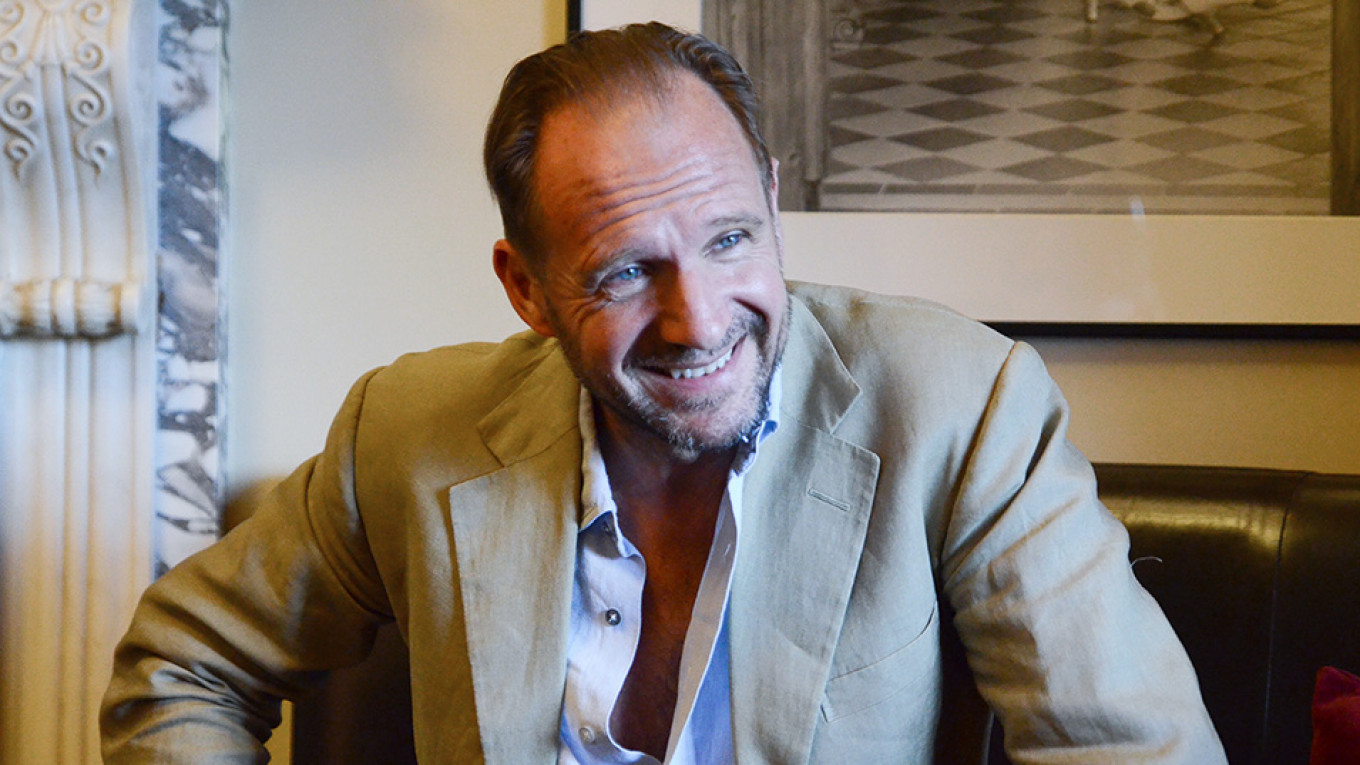Ralph Fiennes came to St. Petersburg to show the director’s cut of his film “Nureyev. The White Crow” to the local cast and crew. He spoke with The Moscow Times about talking on Russian trains, feeling like an outsider, and making internal shifts visible.
An athletic young man walks along Ulitsa Rossi. Behind him at the end of the deserted street the stately Alexandrinsky theater rises up in the distance. His clothes are modest, but his manner is confident. He crosses the road and enters the legendary Vaganova Ballet Academy, Russia’s most prestigious ballet school.
Ralph Fiennes had had this shot in mind long before he came to St. Petersburg to film “Nureyev. The White Crow” in the summer of 2017. With shots like this that suddenly appear in a director’s mind’s eye and won’t leave, no one knows if they’ll work: The idea may seem beautiful and captivating, but when you are confronted with physical reality, sometimes it’s impossible. For Fiennes, however, it turned out well. The scene is now part of the film and one of the director’s most memorable moments of the shooting period.
“Nureyev crosses the road into his life” is what he calls it.
The pull of Russia
Fiennes crossed a road into a new life, too, except he entered Russia rather than left it.
When he was growing up, he listened to his father’s many stories of battles, kings, generals and personalities throughout history. David Lean’s “Doctor Zhivago” was the catalyst that got him reading about Russia. It was the first time he saw a revolution depicted, a mind-blowing experience for 8-year-old Ralph.
Years later, after he’d already played Chekhov’s Ivanov at drama school, he had a teacher of the history of the theater and related subjects who would give students ideas about speeches for auditions. He drew Fiennes’ attention to Yevgeny Onegin, a role he portrayed to critical acclaim in a film that was his sister Martha’s directorial debut in 1999.
“I read the story and this whole landscape opens up for me,” he said. “This figure of Onegin seemed so modern, and moody and cynical, and the arc of the story is so perfect.”
In a beautiful coincidence, when the crew was preparing to film Onegin in 1997, Fiennes was playing Ivanov professionally, and that production came to the Maly Theater in Moscow. It was his first time in Russia. Fiennes saw Red Square, the Kremlin, the Tretyakov Gallery, and then took an overnight train to St. Petersburg. “All this excites me; and the Russian people who I meet open themselves to me in a way which is very unusual and very direct,” he recalled. “I sat on the train to Mikhailovskoye with Andrei Peshehodko, the translator, to see Pushkin’s house. We argued all night about why Tatyana says to Onegin ‘You are too late.’ I cannot imagine this conversation on a train in England, where it would be something like ‘It is a book, I read it, yes, it is interesting, you know, did you see that series on television last night…’
“I had all these experiences coming at me that did something in the head and in the heart. And it ended up being a kind of love affair with the Russian people and culture.”
Two white crows

What originally connected Ralph Fiennes with Nureyev was the story of a young boy and his ferocious sense of destiny, his hunger for dance, and his hunger for art. It was something that the actor and director identified with. His interest was piqued almost 20 years ago, when Julie Kavanagh sent Fiennes the first six chapters of her book “Nureyev. The Life.”
“When I read these chapters … I thought, ‘This is a fantastic film’,” he recalled. “I was not a dancer. Nothing about me was designed to play Nureyev, and back then I had no conscious sense that I wanted to direct. I was scratching my head, thinking this was brilliant but not sure why Julie was sending me these chapters. I loved it, but I sort of put it in a box inside my head, and I got on with my life making films and plays.”
In 2011 after Fiennes directed his first films, “Coriolanus” and “The Invisible Woman,” the producer of both films, Gaby Tana, who had a background in ballet, reminded Fiennes about that box and suggested it might be time to open it and explore the contents. But Fiennes found it daunting.
“Nureyev is so big, so iconic so well-known, so well-documented, and I do not have a background in ballet,” Fiennes said. “I am coming to this because of the spirit that Julie’s book described to me. It is the spirit that I identify with. I was taken by the story of a boy from a poor background in Ufa who has this sense of destiny and ends up in this particular situation in Le Bourget airport in Paris in June 1961, and he has to make an essential decision about his life and his art.”
The Russian expression taken for the title, “The White Crow,” describes a feeling Fiennes knows well. “When I was about 13 or 14, I went to school on a train. It was a twenty-minute train ride, and some boys decided I was a white crow, and they started to tease me, make jokes about me being gay or being somehow not manly. At the time when I was wanting to prove myself in sports and I was interested in girls, this was very humiliating and very upsetting.”
“I have generally felt on the outside,” he added. “For instance, I have never enjoyed being in a crowd of blokes, guys, going to a pub or watching football. I have always been the boy who goes into a corner and reads a book.”
The director's cut
On July 3, 2019, more than three months after the film’s Russian premiere, Fiennes returned to St. Petersburg for a special screening of “The White Crow” in Angleterre Cinema, which was organized for those who helped make the film. At the screening, the director’s cut was shown. In Russia after the premiere, the film ran in a cut version that excluded the scene of Nureyev and Teja Kremke in bed and some full-frontal male nudity.
The edit is a frustrating experience for Fiennes. “I expressed my feelings at length, because the first signal from the distribution company, Disney, was that there is nothing in this that we think is a problem,” he recalls. “But the reason was, I am told, not to do with censorship but to do with commercial reasons: if we cut this, we can show the film to young people.”
Although he was assured that two versions would be shown in Russian cinemas, only the edited version was screened. Fiennes was told it was because none of the cinema owners would take the uncut version.
This seems to be due to Russia’s notorious 2013 “gay propaganda” law, which was designed, according to its authors, to protect the country’s young people from the “promotion of nontraditional sexual relations.” The law spawned a cultural policy that removes any hint of an LGBT connection or affiliation from the public eye.
“Whether or not there is some state influence, I do not know,” Fiennes said. “It is a business decision that I cannot control,” Fiennes said. “I have a dream that perhaps in the future some cinemas will agree with Disney to sometimes show my cut of the film.”
In the U.K., there has been an appetite to see more of the homosexual life of the dancer, Fiennes said. But after doing considerable research, Fiennes realized that the Nureyev he was putting on screen was not leading a promiscuous sexual life. Instead, he was finding himself sexually. He was seduced by Ksenia Pushkina and had an intimate gay relationship with Teja Kremke. Fiennes sought to explore the side of Nureyev that was curious, listening, absorbing, taking in.
“However, Nureyev was very much in touch with his libido. He enjoyed it. And perhaps, if I could turn the clock back, I would emphasize this a bit more in the film,” he added.

Choosing Nureyev
For the role of Nureyev, the director never really considered a drama actor. The idea of finding a ballet dancer who would have the talent to play Nureyev very much appealed to Fiennes — and not just because it would save the crew from looking for countless doubles for the rehearsal scenes, a taxing and costly business. Having a dramatically gifted dancer play Nureyev would give the film integrity, an experience of wholeness for both the actor and the audience.
Fiennes could not have been happier with the Tatar State Opera and Ballet Theater principal Oleg Yvenko.
“I was looking for a number of things which are hard to describe: a quality of passionate modesty and of artistic hunger, a quality of impatience, and certainly a quality of arrogance or sense of destiny,” Fiennes said. “There isn’t any one thing, but rather many different facets, and each scene needed something different. Once I had invited Oleg, we spent many, many hours going through the screenplay, again and again and again. In a sort of way, part of me was acting it out as myself to understand and be able to communicate. I can remember, for instance, the scene where Ksenia Pushkina (Chulpan Khamatova) brings him the soup when he is practicing. This woman whom he does not know comes into the room, and he is on his own. He is very protective of his privacy; he watches her like a deer. And then she starts to talk, and because of the way she talks and what she says, he is interested. So she breaks through the invisible barrier of resistance. As she leaves, his layers of protectiveness go, and he says: ‘Your husband is a very good man. His classes are two holy hours.’ Honesty comes out.
“These are interior things, shifts inside. With someone you don’t know, you are cautious, and then you listen to what they say and suddenly you can say what you think. This is what I was talking to Oleg about — making these internal shifts visible.”

Playing Pushkin
There is often a wise and sensitive teacher, coach or mentor behind a distinguished career. For Nureyev, this was Alexander Pushkin. Nureyev even went as far as to force the Vaganova Academy authorities to change his teacher from Valentin Shelkov to Alexander Pushkin, an audacious if not insolent move that had been unprecedented at the venerable ballet school.
“I have spoken to people, including Misha Baryshnikov, about Pushkin, and what came to me was man who was very sensitive, very kind, very passionate only about teaching ballet,” said Fiennes, who played the role of Pushkin in “The White Crow.” “A very dignified man who lives in a very particular world, which is just guiding young dancers to be their best. His style was to gently instruct and hope that students will discover their mistakes themselves and then correct them. Which is quite a wise way of teaching, I think.”
Stopping at the start
One of the main questions viewers had about the film was why Fiennes ended it with the dancer's defection from the U.S.S.R. Why didn’t he continue to tell the story of Nureyev’s life?
The answer is simple: To tell the best story.
“Complete biographies are not always good stories,” he said, smiling. “Yes, I suppose, it could be a mini-series. You have the first episode at Le Bourget [airport where Nureyev defected], the second episode would be Margot Fonteyn, then the love affair with Erik Bruhn, then Nureyev is an international star with unapologetically gay life-style and was very promiscuous man. And the last episode is at the Paris Opera when he is sick from AIDS. I can see this as a biopic, but it does not motivate me. I have a story about a young man's sense of his destiny.”
A Message from The Moscow Times:
Dear readers,
We are facing unprecedented challenges. Russia's Prosecutor General's Office has designated The Moscow Times as an "undesirable" organization, criminalizing our work and putting our staff at risk of prosecution. This follows our earlier unjust labeling as a "foreign agent."
These actions are direct attempts to silence independent journalism in Russia. The authorities claim our work "discredits the decisions of the Russian leadership." We see things differently: we strive to provide accurate, unbiased reporting on Russia.
We, the journalists of The Moscow Times, refuse to be silenced. But to continue our work, we need your help.
Your support, no matter how small, makes a world of difference. If you can, please support us monthly starting from just $2. It's quick to set up, and every contribution makes a significant impact.
By supporting The Moscow Times, you're defending open, independent journalism in the face of repression. Thank you for standing with us.
Remind me later.






